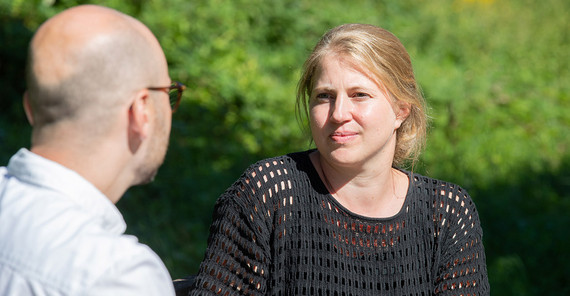People who lived in the 17th or 18th century would rub their eyes in disbelief about a healthcare sector in which even people who have no health issues go to the doctor. Sociologists and cultural studies scholars take the ubiquity of preventive healthcare, close medical check-ups, and the imperative maintenance of good health as an expression of a profound biomedicalization of society.
It's a process that makes biological knowledge and a clinical view of things second nature to us – as the pandemic state of emergency has impressively demonstrated. “At the same time, biomedicalization refers to the possibility of changing the body if it does not conform to the ‘healthy’ norm,” explains Frederike Offizier, who teaches and researches at the Institute of English and American Studies at the University of Potsdam.
“In English, the term bioliteracy refers to being literate in a biological context,” she explains. “In our biomedicalized world, however, we are no longer necessarily able to interpret our bodies ourselves. In case of illnesses and medical interventions, genetic tests and preventive examinations are used to predict risks.”
Health as a precarious condition
The American studies scholar completed her doctorate on the topic of biosecurity at the intersection of health, security, and identity in North America. She has been studying the cultural and social manifestations of biological thinking for many years. From prenatal diagnostics and innovative blood tests for the early detection of impending dementia to genetic evidence of an increased risk of cancer: The molecular view on certain diseases shifts the focus from really experienced suffering to the risk of a future illness.
“Today, we seem to take staying healthy and growing old, which were very rare in the past, for granted,” explains the cultural scientist. “But also that we have to fight diseases before they even break out.” The knowledge of one's own risk of illness increasingly shifts the self-perception of those affected into the shadow cast by the illness itself.
Minority Report says hello
In the 1980s, the idea that women with an increased risk of breast cancer would have both breasts amputated as a precautionary measure to survive a disease that is only threatening to break out could have been the stuff of science fiction à la Philip K. Dick. Since then, genetic tests have become common in diagnostics, and prominent high-risk patients such as Angelina Jolie have gone public with their genetic predisposition and have become advocates of “anticipatory survival” in the media.
Between 1998 and 2011, the number of preventive double mastectomies in the US rose from 2% to over 12% of the total group. Technological progress, but also the narrative of the self-determined fight against one’s own sword of Damocles, have greatly changed society’s perception of this disease.
In English parlance, Jolie’s conscious decision to prophylactically remove (still) healthy parts of her body makes her a so-called previvor. “It describes a pre-survival, not surviving a disease but overcoming the risk of developing it,” Offizier says. “In the US media, it is described as both a heroic struggle and an act of self-empowerment.” However, it is an empowerment that naturally remains the privilege of a solvent and educated segment of US American society.
From divine omen to Fitbit & Co.
And what about biosecurity in Germany? Ever since knowledge of the risk factors for cardiovascular diseases and other common ailments became foundational for the well-informed individual, unconditional health maintenance has developed a plausible narrative as a lifestyle choice. The fitness tracker on the wrist and the pedometer app for the smartphone are typical accessories of our time. Only the collected data provides individuals concerned with their physical health the reassurance that they have eaten well or slept enough. Ironically, it is usually those in perfect health who scroll through reports on their sleep quality in the morning or suddenly start jogging in place in the evening so as not to miss their daily exercise target – lest ... well, what exactly?
Constant self-surveillance comes as much from the individual desire for self-optimization as it does from mistrust towards one’s own body. An occasionally obsessive project that is reminiscent of Christian and religious movements, Dr. Offizier says. “There’s something puritanical about constantly checking yourself and promising yourself a salvation that you can never be sure of,” she says. “The other parallel to the Puritans is the constant search for signs that need to be read and interpreted. We have to prove from the outside that we have resisted a danger.”
Frederike Offizier is a lecturer and researcher in the American Studies Department of the University of Potsdam.
Book recommendation:
The Biosecurity Individual. A Cultural Critique of the Intersection between Health, Security, and Identity by Frederike Offizier was supported by the Publication Fund Open Access Monographs of the Federal State of Brandenburg and published in print and for download in 2024. It analyzes the body-political, social, and literary-fictional varieties of “biosecurity,” a concept that has developed into a dominant paradigm of self-(preventive) care in the 20th and 21st century.
This text (in german language) was published in the university magazine Portal - Zwei 2024 „Europa“ (PDF).

